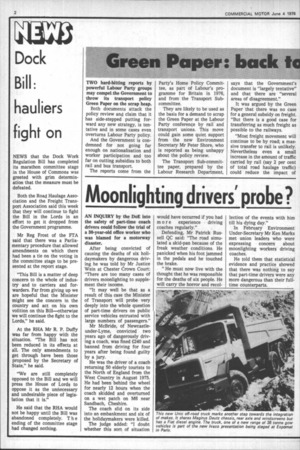ALB Dock Bill: hauliers fight on
Page 4

If you've noticed an error in this article please click here to report it so we can fix it.
NEWS that the Dock Work Regulation Bill has completed its marathon committee stage in the House of Commons was greeted with grim determination that the measure must be defeated.
Both the Road Haulage Association and the Freight Transport Association said this week that they will continue to fight the Bill in the Lords in an effort to get it dropped from the Government programme.
Mr Reg Frost of the ETA said that there was a Parliamentary procedure that allowed amendments on which there had been a tie on the voting in the committee stage to be presented at the report stage.
"This Bill is a matter of deep concern to the whole of industry and to carriers and forwarders. Far from giving up we are hopeful that the Minister might see the concern in the country and act on his own volition on this Bill—otherwise we will continue the fight to the Lords," he said.
At the RHA Mr R. P. Duffy was far from happy with the situation. "The Bill has not been reduced in its effects at all. The only amendments to get through have been those proposed by the Secretary of State," he said.
"We are still completely opposed to the Bill and we will press the House of Lords to oppose it as the unnecessary and undesirable piece of legislation that it is."
He said that the RHA would not be happy until the Bill was abandoned completely. T h e ending of the committee stage had changed nothing. TWO hard-hitting reports by powerful Labour Party groups may compel the Government to throw its transport policy Green Paper on the scrap heap.
Both documents attack the policy review and claim that it has side-stepped putting forward any new strategy, is tentative and in some cases even overturns Labour Party policy.
And the Government is condemned for not going far enough on nationalisation and worker participation and too far on cutting subsidies to both rail and bus transport.
The reports come from the Party's Home Policy Committee, as part of Labour's programme for Britain in 1976, and from the Transport Subcommittee.
They are likely to be used as the basis for a demand to scrap the Green Paper at the Labour Party conference by rail and transport unions. This move could gain some quiet support from the new Environment Secretary Mr Peter Shore, who is reported as being unhappy about the policy review.
The Transport Sub-committee paper, prepared by the Labour Research Department, says that the Government's document is "largely tentative" and that there are "several areas of disagreement."
It was argued •by the Green Paper that there was no case for a general subsidy on freight. "But there is a good case for transferring as much freight as possible to the railways.
"Most freight movement will continue to be by road; a massive transfer to rail is unlikely. Nevertheless even a small increase in the amount of traffic carried by rail (say 2 per cent of total road haulage traffic) could reduce the impact of




























































































































